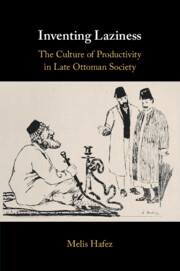Book contents
- Inventing Laziness
- Inventing Laziness
- Copyright page
- Contents
- Figures
- Preface
- Acknowledgments
- A Note on Translations and Transliteration
- Introduction
- 1 Moralizing Productivity in the Age of Reform
- 2 Criminalizing Laziness
- 3 Imagining Ottoman Dandies and Industrious Effendis
- 4 Militarizing the Productive Body
- 5 Exclusionism at Work
- Epilogue
- Bibliography
- Index
5 - Exclusionism at Work
Politics, Power, and Productivity
Published online by Cambridge University Press: 10 December 2021
- Inventing Laziness
- Inventing Laziness
- Copyright page
- Contents
- Figures
- Preface
- Acknowledgments
- A Note on Translations and Transliteration
- Introduction
- 1 Moralizing Productivity in the Age of Reform
- 2 Criminalizing Laziness
- 3 Imagining Ottoman Dandies and Industrious Effendis
- 4 Militarizing the Productive Body
- 5 Exclusionism at Work
- Epilogue
- Bibliography
- Index
Summary
Chapter 5 focuses on the elusive boundary between the lazy and the industrious in the post-1908 Young Turk era. In this tumultuous period, the Ottoman culture producers employed the concepts of work and laziness to further develop the exclusionary language characteristic of the culture of productivity against their rivals. Surveying political pamphlets, journals, memoirs, and the daily press, this chapter shows how various ideological camps entered into a cultural struggle over who should be regarded as lazy and useless based on a putative association with “super Westernization” or with “anti-progressivism.” In the relatively open political atmosphere immediately following the 1908 revolution, the polemics between various political agents, usually dubbed “Westernists” and “Islamists,” signalled a vital debate on the ideal citizen required by the nation. Their views of these issues diverged greatly, as did the question of who should be labeled lazy and unproductive. Such labels marshaled the exclusionary language that has been in development, revealing a variety of models of reform in the public sphere and how each one regarded the other as the cause of laziness.
Keywords
Information
- Type
- Chapter
- Information
- Inventing LazinessThe Culture of Productivity in Late Ottoman Society, pp. 221 - 248Publisher: Cambridge University PressPrint publication year: 2021
